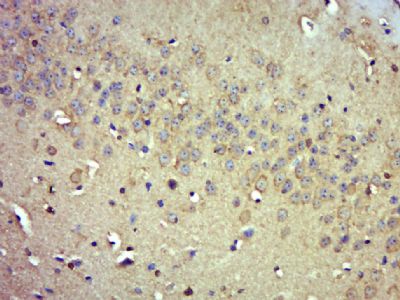PDE9A Polyclonal Antibody
Purified Rabbit Polyclonal Antibody (Pab)
- SPECIFICATION
- CITATIONS
- PROTOCOLS
- BACKGROUND

Application
| IHC-P, IHC-F, IF, ICC |
|---|---|
| Primary Accession | O76083 |
| Reactivity | Rat, Pig, Bovine |
| Host | Rabbit |
| Clonality | Polyclonal |
| Calculated MW | 70-73 KDa |
| Physical State | Liquid |
| Immunogen | KLH conjugated synthetic peptide derived from human PDE9A |
| Epitope Specificity | 21-120/593 |
| Isotype | IgG |
| Purity | affinity purified by Protein A |
| Buffer | 0.01M TBS (pH7.4) with 1% BSA, 0.02% Proclin300 and 50% Glycerol. |
| SUBCELLULAR LOCATION | Cytoplasm. Endoplasmic reticulum; Cell projection > ruffle membrane. Cytoplasm > perinuclear region and Cell projection > ruffle membrane. Cytoplasm > perinuclear region. Golgi apparatus. Endoplasmic reticulum. |
| SIMILARITY | Belongs to the cyclic nucleotide phosphodiesterase family. PDE9 subfamily. |
| Important Note | This product as supplied is intended for research use only, not for use in human, therapeutic or diagnostic applications. |
| Background Descriptions | The protein encoded by this gene catalyzes the hydrolysis of cAMP and cGMP to their corresponding monophosphates. The encoded protein plays a role in signal transduction by regulating the intracellular concentration of these cyclic nucleotides. Multiple transcript variants encoding several different isoforms have been found for this gene. [provided by RefSeq, Jul 2008] |
| Gene ID | 5152 |
|---|---|
| Other Names | High affinity cGMP-specific 3', 5'-cyclic phosphodiesterase 9A, 3.1.4.35, PDE9A (HGNC:8795) |
| Target/Specificity | Expressed in all tissues examined (testis, brain, small intestine, skeletal muscle, heart, lung, thymus, spleen, placenta, kidney, liver, pancreas, ovary and prostate) except blood. Highest levels in brain, heart, kidney, spleen, prostate and colon. Isoform PDE9A12 is found in prostate. |
| Dilution | IHC-P=1:100-500,IHC-F=1:100-500,ICC=1:100-500,IF=1:100-500 |
| Storage | Store at -20 ℃ for one year. Avoid repeated freeze/thaw cycles. When reconstituted in sterile pH 7.4 0.01M PBS or diluent of antibody the antibody is stable for at least two weeks at 2-4 ℃. |
| Name | PDE9A (HGNC:8795) |
|---|---|
| Function | Specifically hydrolyzes the second messenger cGMP, which is a key regulator of many important physiological processes. Highly specific: compared to other members of the cyclic nucleotide phosphodiesterase family, has the highest affinity and selectivity for cGMP (PubMed:18757755, PubMed:21483814, PubMed:9624146). Specifically regulates natriuretic-peptide-dependent cGMP signaling in heart, acting as a regulator of cardiac hypertrophy in myocytes and muscle. Does not regulate nitric oxide-dependent cGMP in heart (PubMed:25799991). Additional experiments are required to confirm whether its ability to hydrolyze natriuretic-peptide-dependent cGMP is specific to heart or is a general feature of the protein (Probable). In brain, involved in cognitive function, such as learning and long-term memory (By similarity). |
| Cellular Location | [Isoform PDE9A1]: Cell projection, ruffle membrane. Cytoplasm, perinuclear region. Golgi apparatus. Endoplasmic reticulum. Cell membrane, sarcolemma [Isoform PDE9A3]: Cytoplasm. Endoplasmic reticulum |
| Tissue Location | Expressed in all tissues examined (testis, brain, small intestine, skeletal muscle, heart, lung, thymus, spleen, placenta, kidney, liver, pancreas, ovary and prostate) except blood (PubMed:9624146). Highest levels in brain, heart, kidney, spleen, prostate and colon. Isoform PDE9A12 is found in prostate (PubMed:12565835). In brain, present in the cortex, cerebellum, and subiculum (at protein level) (PubMed:22328573). In heart, primarily localizes to myocytes (PubMed:25799991). |

Thousands of laboratories across the world have published research that depended on the performance of antibodies from Abcepta to advance their research. Check out links to articles that cite our products in major peer-reviewed journals, organized by research category.
info@abcepta.com, and receive a free "I Love Antibodies" mug.
Provided below are standard protocols that you may find useful for product applications.
If you have used an Abcepta product and would like to share how it has performed, please click on the "Submit Review" button and provide the requested information. Our staff will examine and post your review and contact you if needed.
If you have any additional inquiries please email technical services at tech@abcepta.com.













 Foundational characteristics of cancer include proliferation, angiogenesis, migration, evasion of apoptosis, and cellular immortality. Find key markers for these cellular processes and antibodies to detect them.
Foundational characteristics of cancer include proliferation, angiogenesis, migration, evasion of apoptosis, and cellular immortality. Find key markers for these cellular processes and antibodies to detect them. The SUMOplot™ Analysis Program predicts and scores sumoylation sites in your protein. SUMOylation is a post-translational modification involved in various cellular processes, such as nuclear-cytosolic transport, transcriptional regulation, apoptosis, protein stability, response to stress, and progression through the cell cycle.
The SUMOplot™ Analysis Program predicts and scores sumoylation sites in your protein. SUMOylation is a post-translational modification involved in various cellular processes, such as nuclear-cytosolic transport, transcriptional regulation, apoptosis, protein stability, response to stress, and progression through the cell cycle. The Autophagy Receptor Motif Plotter predicts and scores autophagy receptor binding sites in your protein. Identifying proteins connected to this pathway is critical to understanding the role of autophagy in physiological as well as pathological processes such as development, differentiation, neurodegenerative diseases, stress, infection, and cancer.
The Autophagy Receptor Motif Plotter predicts and scores autophagy receptor binding sites in your protein. Identifying proteins connected to this pathway is critical to understanding the role of autophagy in physiological as well as pathological processes such as development, differentiation, neurodegenerative diseases, stress, infection, and cancer.


